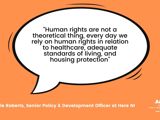The right to be free from inhuman or degrading treatment may be at risk if someone is at risk of persecution because of their sexual orientation
SC was a Jamaican national who moved to the UK with his mother. SC was straight but his mother was a lesbian and the family had been subjected to homophobic harassment and persecution in Jamaica. They were granted asylum in the UK but after SC was convicted of criminal offences, the Home Office said they were going to send him back to Jamaica. The Home Office recognised that he would be at risk of inhumane or degrading treatment in the cities of Jamaica but said he could move to the countryside to avoid this. However, the Supreme Court said this was not reasonable, partly because SC was suffering with a highly complex form of PTSD and would need long-term psychological treatment that he could not access in rural areas. The Court therefore said deporting SC would breach his Article 3 right to be free from inhuman or degrading treatment so he should be allowed to stay in the UK.



